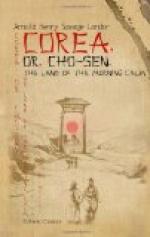After its annexation to China, the Korai state remained crippled by the terrible blow it had received, for the Ko-Korai line of kings had been utterly expelled after having reigned for over seven centuries, but at last it picked up a little strength again through fresh migrations from the north-west, and in the second decade of the tenth century a Buddhist monk called Kung-wo raised a rebellion and proclaimed himself king, establishing his court at Kaichow.
One of Kung-wo’s officers, however, Wang by name, who was believed to be a descendant of the Korai family, did away with the royal monk and sat himself on the throne, which he claimed as that of his ancestors. Coming of a vigorous stock, and taking advantage of the fact that China was weak with internal wars, Wang succeeded in uniting Shinra to the old Korai, thus converting the whole peninsula into a single and united realm, of which, as we have already seen in the first chapter, he made the walled city of Sunto the capital. Wang died 945 A.D., and was succeeded by his son Wu, who wisely entered into friendly relations with China, and paid his tribute to the Emperor of Heaven as if he ruled a tributary state. In consequence of this policy it was that Corea enjoyed peace with her terrible Celestial rival for the best part of two centuries.
Cho-sen, then, is now the only name by which the country is called by the natives themselves, for the name of Korai has been entirely abandoned by the modern Coreans. The meaning of the word is very poetic, viz., “The Land of the Morning Calm,” and is one well adapted to the present Coreans, since, indeed, they seem to have entirely lost the vigour and strength of their predecessors, the Koraians. I believe Marco Polo was the first to mention a country which he called Coria; after whom came the Franciscan missionaries. Little, however, was known of the country until the Portuguese brought back to Europe strange accounts of this curious kingdom and its quaint and warlike people. According to the story, it was a certain Chinese wise man who, when in a poetic mood, baptized Corea with the name of Cho-sen. But the student of Corean history knows that the name had already been bestowed on the northern part of the peninsula and on a certain portion of Manchuria, and that it was in the year 1392, when Korai was united to Shinra and the State of Hiaksai became merged in it, that Cho-sen became the official designation of united Corea. The word “Corea” evidently is nothing but a corruption of the dead and buried word “Korai.”
FOOTNOTES:
[2] Long gown, the national dress of Japan.
CHAPTER III
The road to Seoul—The Mapu—Ponies—Oxen—Coolies—Currency—Mode of carrying weights—The Han River—Nearly locked out.
[Illustration: THE WEST GATE, SEOUL]




